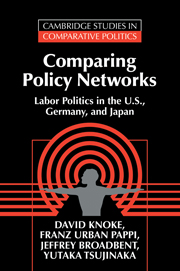Book contents
- Frontmatter
- Contents
- List of tables and figures
- Preface
- Acknowledgements
- 1 Policy-making in the Organizational State
- 2 Three Labor Policy Domains
- 3 Finding Domain Actors
- 4 Organizational Policy Interests
- 5 Policy Webs: Networks, Reputations, and Activities
- 6 Fighting Collectively: Action Sets and Events
- 7 Exchange Processes
- 8 Power Structures
- 9 Variations on a Theme of Organizational States
- Appendix 1 Legislative Procedures in Three Nations
- Appendix 2 Labor Policy Domain Organizations by Type
- Appendix 3 Cluster Analyses of Labor Policy Domain Issues
- Appendix 4 Labor Policy Domain Legislative Bills
- References
- Index
1 - Policy-making in the Organizational State
Published online by Cambridge University Press: 05 June 2012
- Frontmatter
- Contents
- List of tables and figures
- Preface
- Acknowledgements
- 1 Policy-making in the Organizational State
- 2 Three Labor Policy Domains
- 3 Finding Domain Actors
- 4 Organizational Policy Interests
- 5 Policy Webs: Networks, Reputations, and Activities
- 6 Fighting Collectively: Action Sets and Events
- 7 Exchange Processes
- 8 Power Structures
- 9 Variations on a Theme of Organizational States
- Appendix 1 Legislative Procedures in Three Nations
- Appendix 2 Labor Policy Domain Organizations by Type
- Appendix 3 Cluster Analyses of Labor Policy Domain Issues
- Appendix 4 Labor Policy Domain Legislative Bills
- References
- Index
Summary
With the end of the Cold War, the titanic struggle between capitalism and communism no longer preoccupied politicians, the public, and social scientists. Instead, the world entered an era of “competing capitalisms” where the United States, Germany, and Japan played the leading roles. Important international frictions in this new era hinged heavily on economic relationships within and between these nations. During the 1980s, the rapid growth and economic successes of Germany and Japan provoked great consternation in the U.S., which suffered from ballooning trade deficits with both of these competitors. The spectacular economic resurrections of Germany and Japan from the ashes of World War II seemed to originate, at least in part, from relationships among state, industry, labor, and market that differed qualitatively from those in the U.S. Although neither nation developed the bureaucratically centralized command economy of the failed Soviet Union, both Germany and Japan exhibited stronger governmental roles and greater coordination of the business and labor sectors than occurred in the U.S. The ultimate resolution of this increasing international economic friction will depend, importantly, on how Germany, Japan, and the U.S. manage their economies and on how their respective national governments intervene in business-labor relations.
Numerous scholarly studies have uncovered substantial divergences among these three countries' politics, civil societies, and state-society interactions that strongly affect their productivity and growth trajectories. The U.S. long prided itself on being a noninterventionist state, contending that “leaving things to the market” would produce optimal economic outcomes.
Information
- Type
- Chapter
- Information
- Comparing Policy NetworksLabor Politics in the U.S., Germany, and Japan, pp. 1 - 31Publisher: Cambridge University PressPrint publication year: 1996
Accessibility standard: Unknown
Why this information is here
This section outlines the accessibility features of this content - including support for screen readers, full keyboard navigation and high-contrast display options. This may not be relevant for you.Accessibility Information
- 2
- Cited by
